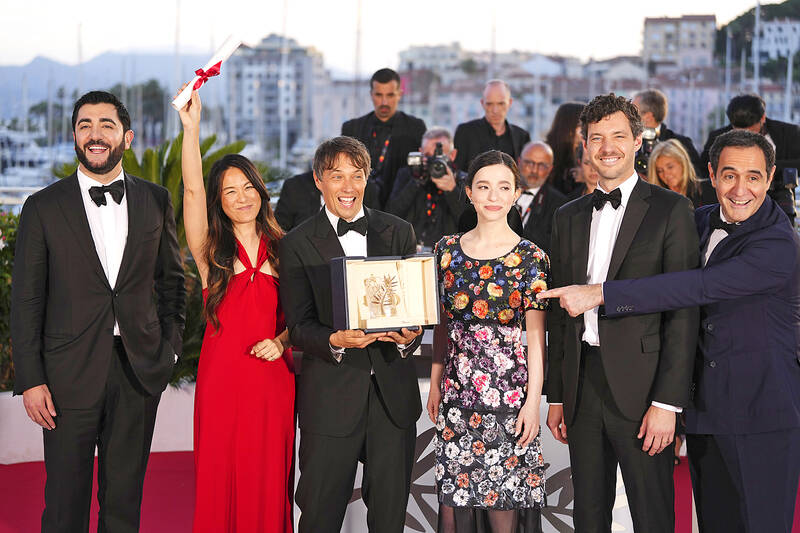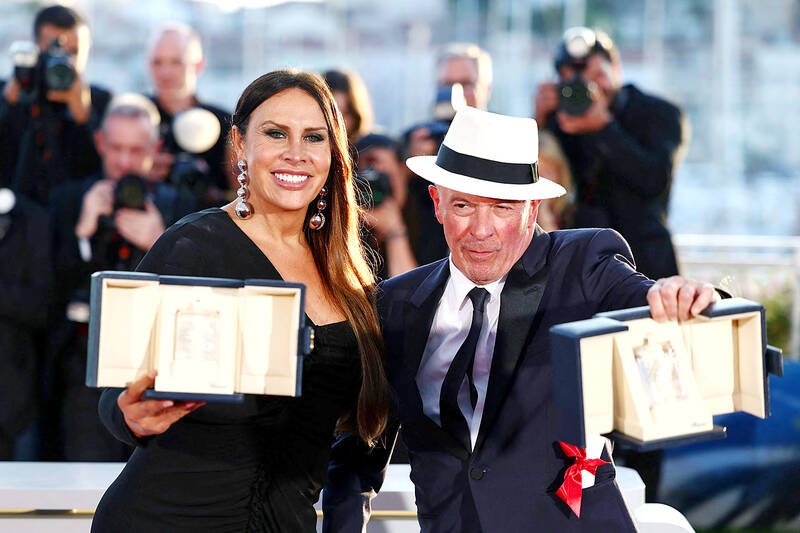Anora, an explicit and often hilarious story about a New York erotic dancer, on Saturday won the Palme d’Or at the Cannes Film Festival, which also saw a first-ever win for a trans actress.
Anora director Sean Baker was confirmed as one of the leading voices of US indie cinema with the prize, which also promises to make a star of 25-year-old Mikey Madison. She plays a dancer who strikes gold with a wealthy client, only to face the wrath of his Russian oligarch parents.
As head of the jury, director Greta Gerwig praised Anora as an “incredible, human and humane film that captured our hearts.”

Photo: AP
“This literally has been my singular goal for the past 30 years, so I’m not really sure what I’m going to do with the rest of my life,” said Baker, who made the acclaimed Red Rocket and The Florida Project.
He dedicated the prize to all sex workers and appealed for filmmakers to “keep cinema alive.”
“This means making films intended for theatrical exhibition,” the 53-year-old said. “The world has to be reminded that watching a film at home while scrolling through your phone and checking e-mails and half paying attention is just not the way — although some tech companies would like us to think so.”

Photo: Reuters
The 77th edition of the festival on the French Riviera saw several highly charged feminist and political movies, and lots of gore and sex.
A trans woman won best actress for the first time, as Karla Sofia Gascon took the award for her role in the audacious musical Emilia Perez, in which she plays a Mexican narco boss who becomes a woman.
The jury shared it between Gascon and her costars Zoe Saldana, Selena Gomez and Adriana Paz — saying they were rewarding the “harmony of sisterhood” — although only Gascon was at the ceremony.
She dedicated it to “all the trans people who are suffering.”
“We all have the opportunity to change for the better, to be better people,” Gascon said. “If you have made us suffer, it is time for you also to change.”
There were fewer meaty roles for men this year. Jesse Plemons took the prize for Yorgos Lanthimos’ bizarro series of short stories, Kinds of Kindness, although he was not present to accept it.
A devastating Iranian film about a family torn apart by the country’s recent women-led protests, The Seed of the Sacred Fig, was given a special jury prize for “drawing attention to unsustainable injustice.”
Its director, Mohammad Rasoulof, 51, escaped from Iran to avoid a lengthy prison sentence just before the festival.
Rasoulof said his heart was with the film’s crew, “still under the pressure of the secret services back in Iran.”
“I am also very sad, deeply sad, to see the disaster experienced by my people every day ... the Iranian people live under a totalitarian regime,” he said.
The second-place Grand Prix went to All We Imagine as Light, the first Indian entry in 30 years. It wowed critics with its poetic monsoon-set portrayal of two women who have migrated to Mumbai to work as nurses.
Emilia Perez also won the third-place Jury Prize for its French director, Jacques Audiard.
Best director went to Portugal’s Miguel Gomes for Grand Tour, an oblique tale about a man abandoning his fiancee and traveling around Asia.
Best screenplay went to The Substance starring Demi Moore, an ultra-gory horror film about the pressures women face to maintain bodily perfection as they age.
“What an incredible gift it has been to work with you,” writer and director Coralie Fargeat told Moore from the stage.
The film is “about women and what women can still experience in the world. We need a revolution, and I don’t think it has really started yet,” she said.
Star Wars creator George Lucas received an honorary Palme d’Or from his friend Francis Ford Coppola, who competed this year with the highly divisive Megalopolis.

FRAUD ALLEGED: The leader of an opposition alliance made allegations of electoral irregularities and called for a protest in Tirana as European leaders are to meet Albanian Prime Minister Edi Rama’s Socialist Party scored a large victory in parliamentary elections, securing him his fourth term, official results showed late on Tuesday. The Socialist Party won 52.1 percent of the vote on Sunday compared with 34.2 percent for an alliance of opposition parties led by his main rival Sali Berisha, according to results released by the Albanian Central Election Commission. Diaspora votes have yet to be counted, but according to initial results, Rama was also leading there. According to projections, the Socialist Party could have more lawmakers than in 2021 elections. At the time, it won 74 seats in the

A Croatian town has come up with a novel solution to solve the issue of working parents when there are no public childcare spaces available: pay grandparents to do it. Samobor, near the capital, Zagreb, has become the first in the country to run a “Grandmother-Grandfather Service,” which pays 360 euros (US$400) a month per child. The scheme allows grandparents to top up their pension, but the authorities also hope it will boost family ties and tackle social isolation as the population ages. “The benefits are multiple,” Samobor Mayor Petra Skrobot told reporters. “Pensions are rather low and for parents it is sometimes

CANCER: Jose Mujica earned the moniker ‘world’s poorest president’ for giving away much of his salary and living a simple life on his farm, with his wife and dog Tributes poured in on Tuesday from across Latin America following the death of former Uruguayan president Jose “Pepe” Mujica, an ex-guerrilla fighter revered by the left for his humility and progressive politics. He was 89. Mujica, who spent a dozen years behind bars for revolutionary activity, lost his battle against cancer after announcing in January that the disease had spread and he would stop treatment. “With deep sorrow, we announce the passing of our comrade Pepe Mujica. President, activist, guide and leader. We will miss you greatly, old friend,” Uruguayan President Yamandu Orsi wrote on X. “Pepe, eternal,” a cyclist shouted out minutes later,

MIGRATION: The Supreme Court justices said they were not deciding whether Trump could legally use the Alien Enemies Act to deport undocumented migrants US President Donald Trump on Friday lashed out at the US Supreme Court after it blocked his bid to resume deportations of alleged Venezuelan gang members, saying the justices are “not allowing me to do what I was elected to do.” Trump’s berating of the high court, in a post on Truth Social, came after it dealt another setback to his attempt to swiftly expel alleged Tren de Aragua (TdA) gang members using an obscure wartime law, the 1798 Alien Enemies Act (AEA). Trump has been at loggerheads with the judiciary ever since he returned to the White House, venting